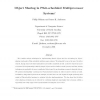Free Online Productivity Tools
i2Speak
i2Symbol
i2OCR
iTex2Img
iWeb2Print
iWeb2Shot
i2Type
iPdf2Split
iPdf2Merge
i2Bopomofo
i2Arabic
i2Style
i2Image
i2PDF
iLatex2Rtf
Sci2ools
104
click to vote
ECRTS
2002
IEEE
2002
IEEE
Object Sharing in Pfair-scheduled Multiprocessor Systems
We consider various techniques for implementing shared objects and for accounting for objectsharing overheads in Pfair-scheduled multiprocessor systems. We primarily focus on the use of lock-free objects, though some lock-based alternatives are briefly considered as well. Lock-free objects are more economical for implementing relatively simple objects such as buffers, stacks, queues, and lists; locking techniques are preferable for more complicated objects and for sychronizing accesses to physical devices. We present schedulability conditions for Pfair-scheduled systems in which lock-free objects are used. In addition, using shared queues as an example, we show how one can exploit the tight synchrony that exists in Pfair-scheduled systems to optimize lock-free implementations. We also show that lock-free object-sharing overheads can be reduced by combining tasks into supertasks; this is because, within a supertask, less-costly uniprocessor synchronization techniques can be used. ∗...
ECRTS 2002 | Embedded Systems | Lock-free Object-sharing Overheads | Lock-free Objects | Shared Objects |
Related Content
| Added | 14 Jul 2010 |
| Updated | 14 Jul 2010 |
| Type | Conference |
| Year | 2002 |
| Where | ECRTS |
| Authors | Philip Holman, James H. Anderson |
Comments (0)

